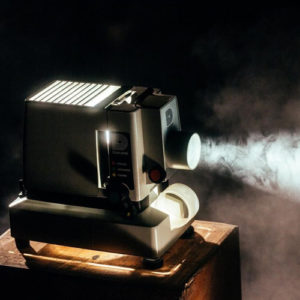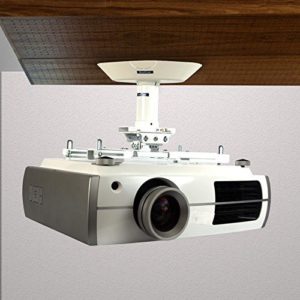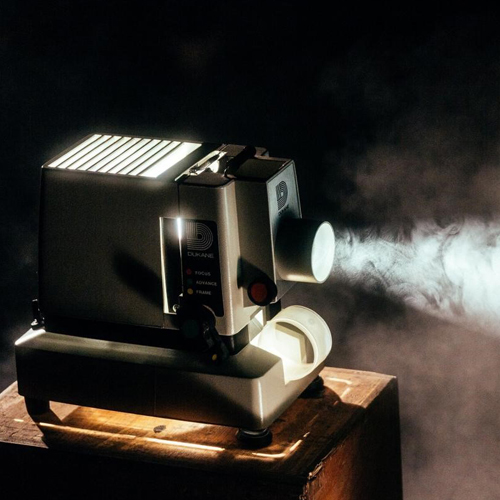When setting up your home theater system, you want everything perfect. Every little detail counts if you want an amazing viewing experience in your home with a booming sound system. Every detail counts, down to the projector ceiling mount.
The wrong projector mount for your projector can cause a wonky picture, an upside-down picture or your expensive project can end up ruined and broken.
You want the perfect projector ceiling mount or standard mount and you want something to secure your projector without any worries. So, how does one find the perfect mount? This article is going to help you choose the right projector mount and ask you the questions you need to be asking yourself before you purchase a mount.
Where’s Are You Going to Mount Your Projector?
First thing’s first, where are you going to mount your projector? The placement is more important than you’d think. Where you plan to place your projector will help determine the type of mount you buy.
It’s the number one question you’ll need to ask yourself before you purchase a ceiling mount or a wall mount. Different mounts work for different types of projectors and digital display screens and the biggest feature you’ll be looking for has to do with where they’ll be mounted.
You can choose to lay your projector or digital display screen out in the open on a table or a bookshelf. But it’s much more likely to be damaged. If you’re worried about space for equipment or a cluttered mess (or protecting your projector from harm), you can choose to mount your projector from the ceiling or on a wall.
These days, projectors have the ability to resize the image no matter where the projection is coming from. Even in the corner of the room and at a strange angle! However, some projectors don’t have the ability to invert the image. This can be a major issue if you want to mount your projector from the ceiling.
You’ll need a special mount that works like a platform instead of turning the projector upside down like you do with most mounts. If your project does invert, you’re in luck! There are thousands of cheaper mounts on the market that will work well with your projector.
Do You Want a Universal or Dedicated mount?

A dedicated mount or projector bracket is like it sounds: It’s dedicated to your specific projector, the specific brand, and the make.
The pattern of the screw holes you’ll need to drill into is exactly aligned with the screw hole patterns of your projector. If you have an expensive projector that will last you for years then a dedicated mount is what you’ll need to look for.
If you don’t plan on ever switching types of projectors, then a dedicated mount or projector bracket will be a perfect choice. They’re easy to install. In a matter of minutes, you can have your projector safely secured with a dedicated mount. But don’t discount universal mounts while you’re shopping around. They have their benefits too. Universal mounts are made to fit different types of projectors. The screw hole patterns can be moved to fit any brand.
To do this, they have arm extensions that can be moved as necessary for your projector. These are the mounts you see that have arms that extend down to hold your mount. It takes a bit more time to set up but with the right universal mount.
However, if you decided to switch up the type of projector your use for your home theater, you’ll never have to purchase a new mount. Lastly, sometimes it can be difficult to find a dedicated mount if you have an older projector model.
How Is the Projector Mount Made?
Ventilation and Overheating
First and foremost, you need to factor in the ventilation of your projector. The biggest cause of a projector that breaks down is when it overheats. Projectors send out a lot of heat when they’re being used. This is why they’re designed with integral cooling fans.
These fans cool down your projector to prevent overheating and ruining the entire projector. You need a mount that won’t cover these special fans. The heat needs to be able to escape and not be confined until the projector blows.
The shape of the mount is an important factor. The less space the mount takes up, the less likely heat will become trapped. Keep in mind that steel is a horrible conductor for heat. It will trap the heat within the projector. An aluminum mount is your best bet.
You need to also keep ventilation in mind when you decide where you’re going to mount your projector in your home.
Weight and Structure
You want a solid mount that can hold the weight of your projector. Know the weight of your projector and know the weight capacity of the mount you plan on purchasing. You need a strong and durable mount. You need to also be able to string cables through the mount to their intended target.
Double check that the mount you want is made of a high-quality material.
Motion Options
Depending on where you’re mounting your projector and the space you have available, you may want to consider the motion options of a mount. Fixed or flat mounts are great if you have no need to move your projector. They keep your projector in one place, safe from harm.
That being said, you may want a mount that can swing out and around if you don’t plan on having your projector in the same place all the time. These mounts use arms to move the mount accordingly. If you need to change where your screen is going to be, you need a mount that can move the projector to different angles.
If you’re battling a horrendous glare because of the room lighting, you’ll also want to invest in a mount that can rotate offering 360 degree views.
 Best Projector Mounts
Best Projector Mounts
- Best inexpensive projector mount (less than $20!): VIVO Universal Adjustable White Ceiling Projector / Projection Mount
- Great universal ceiling mount: Mount-It! Wall or Ceiling Projector Mount
- High-quality black or white mount: QualGear Pro-AV QG-KIT-CA-3IN-W Projector Mount Kit
Conclusion
Buying the perfect projector stand takes a mapped-out plan of where you want your projector to go and any future plans you may have for your home theater.
This guide will help you mentally map out what type of mount you need so you aren’t stuck with a projector mount that just doesn’t work for your specific needs.

